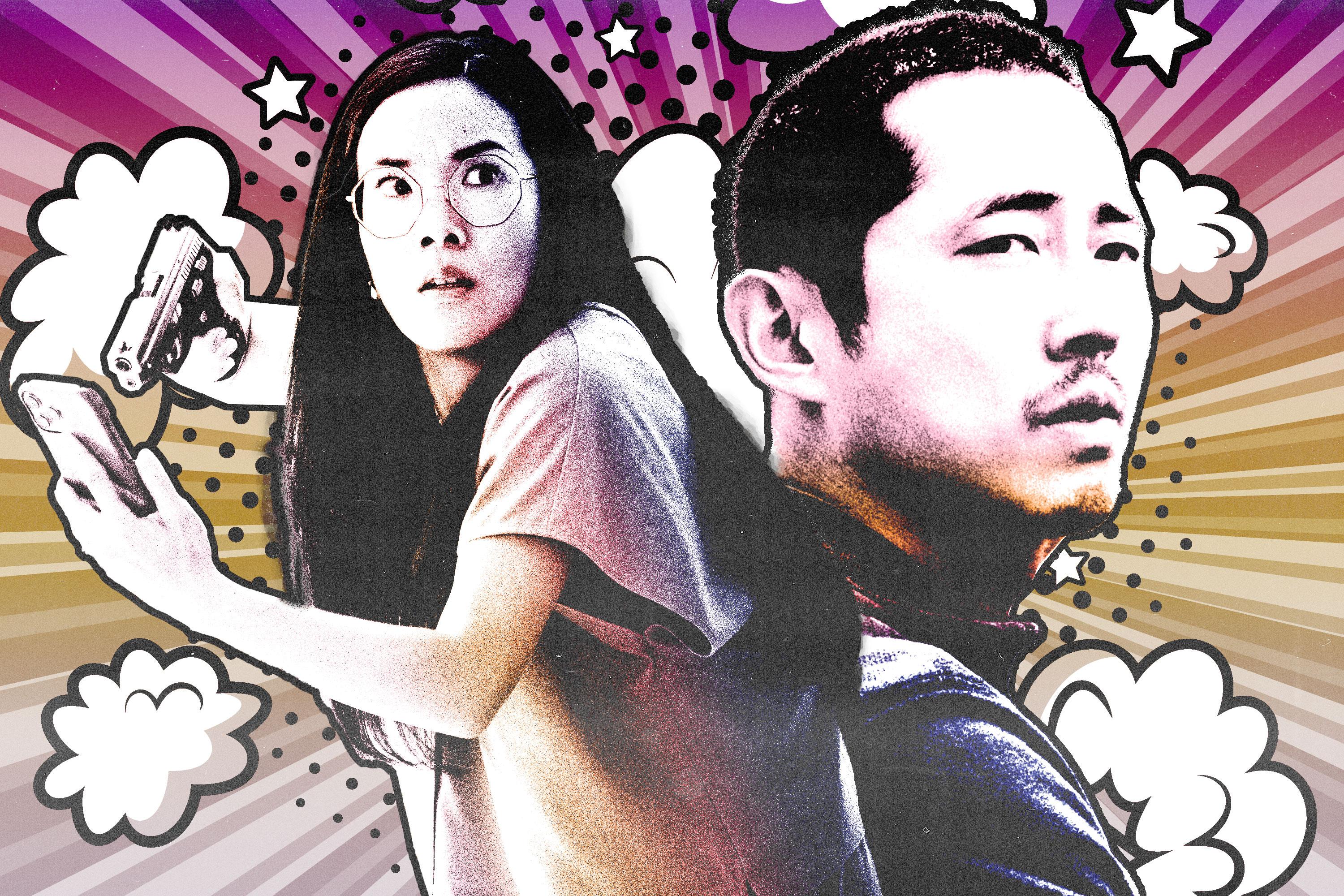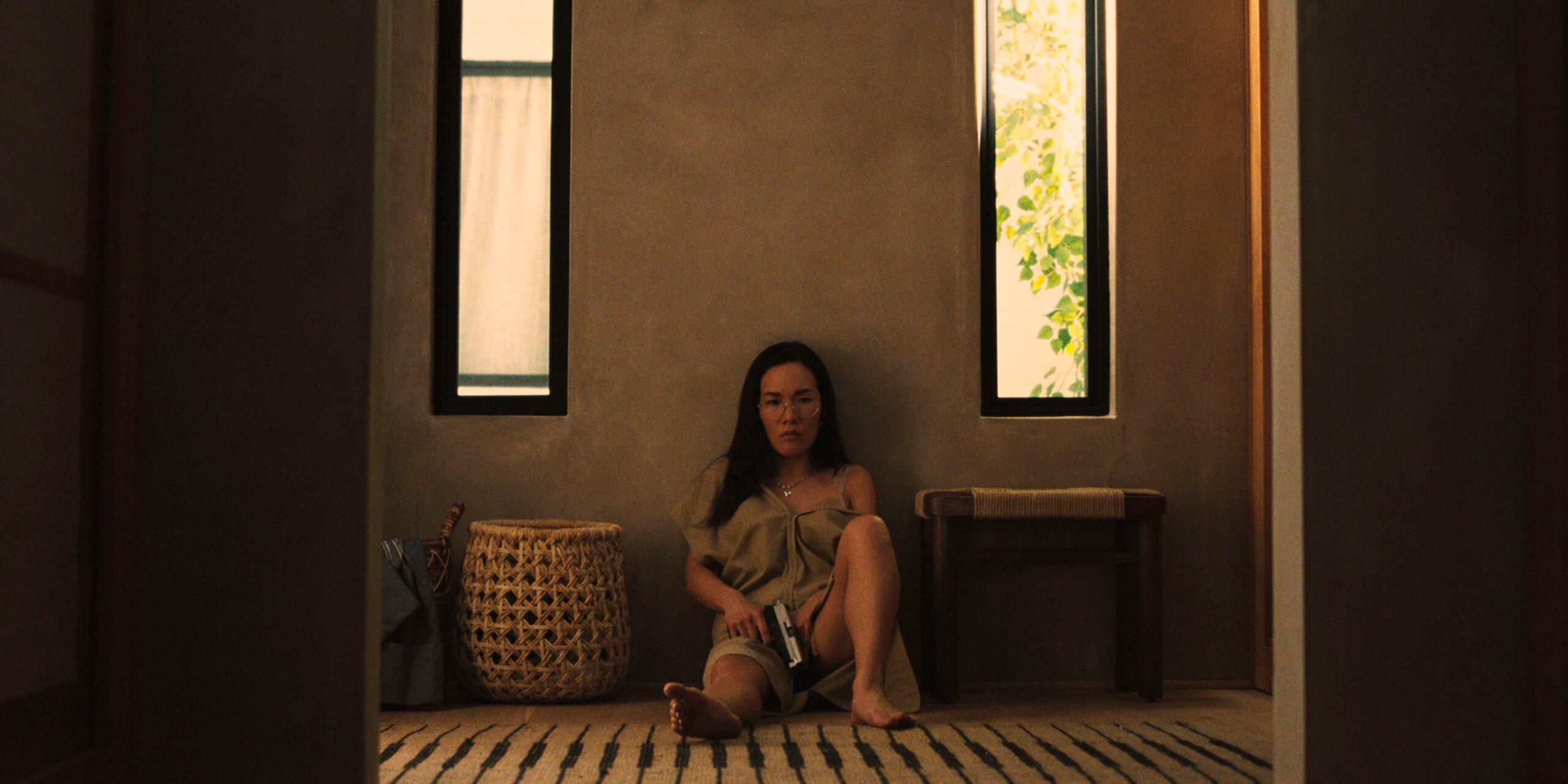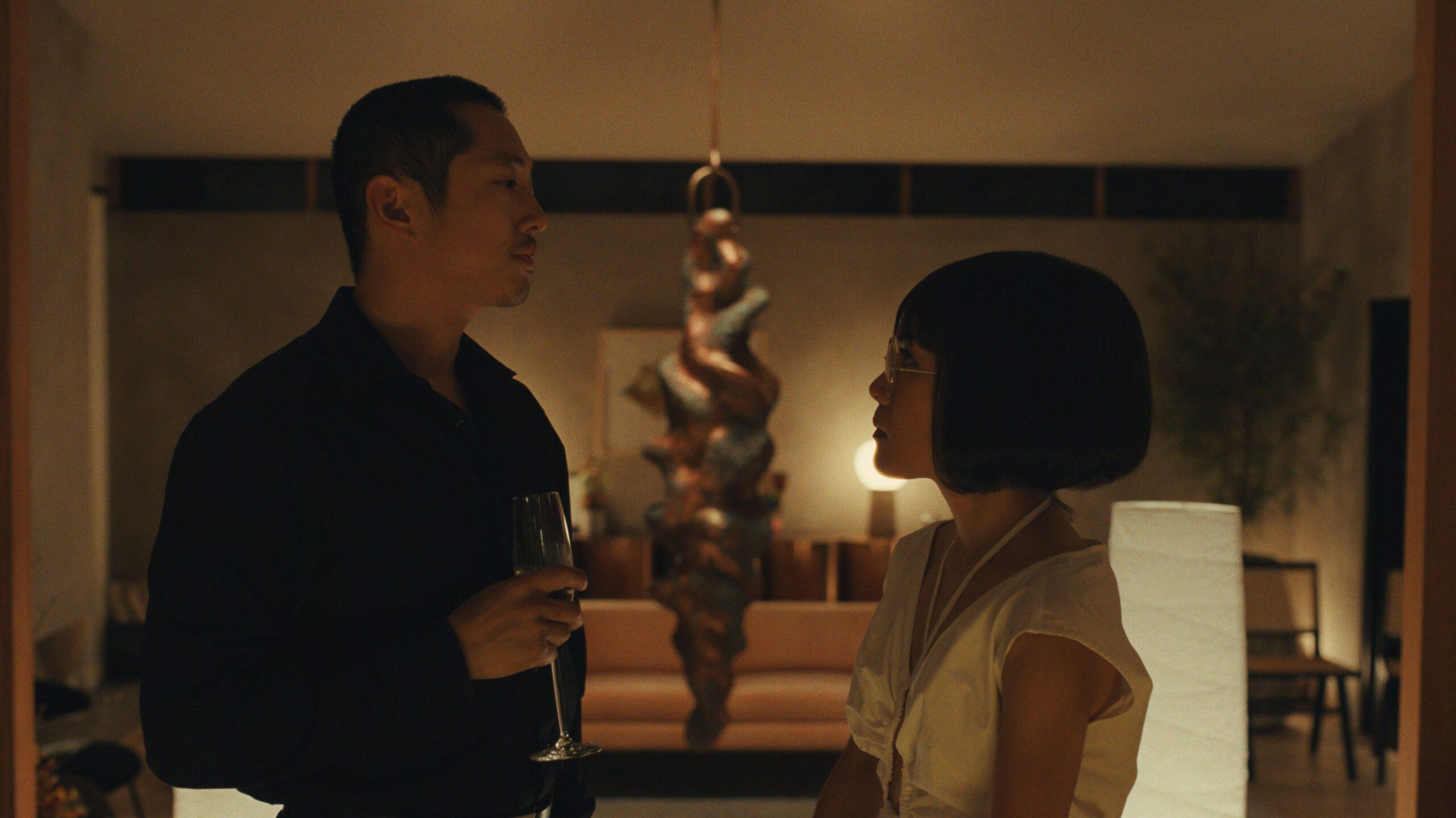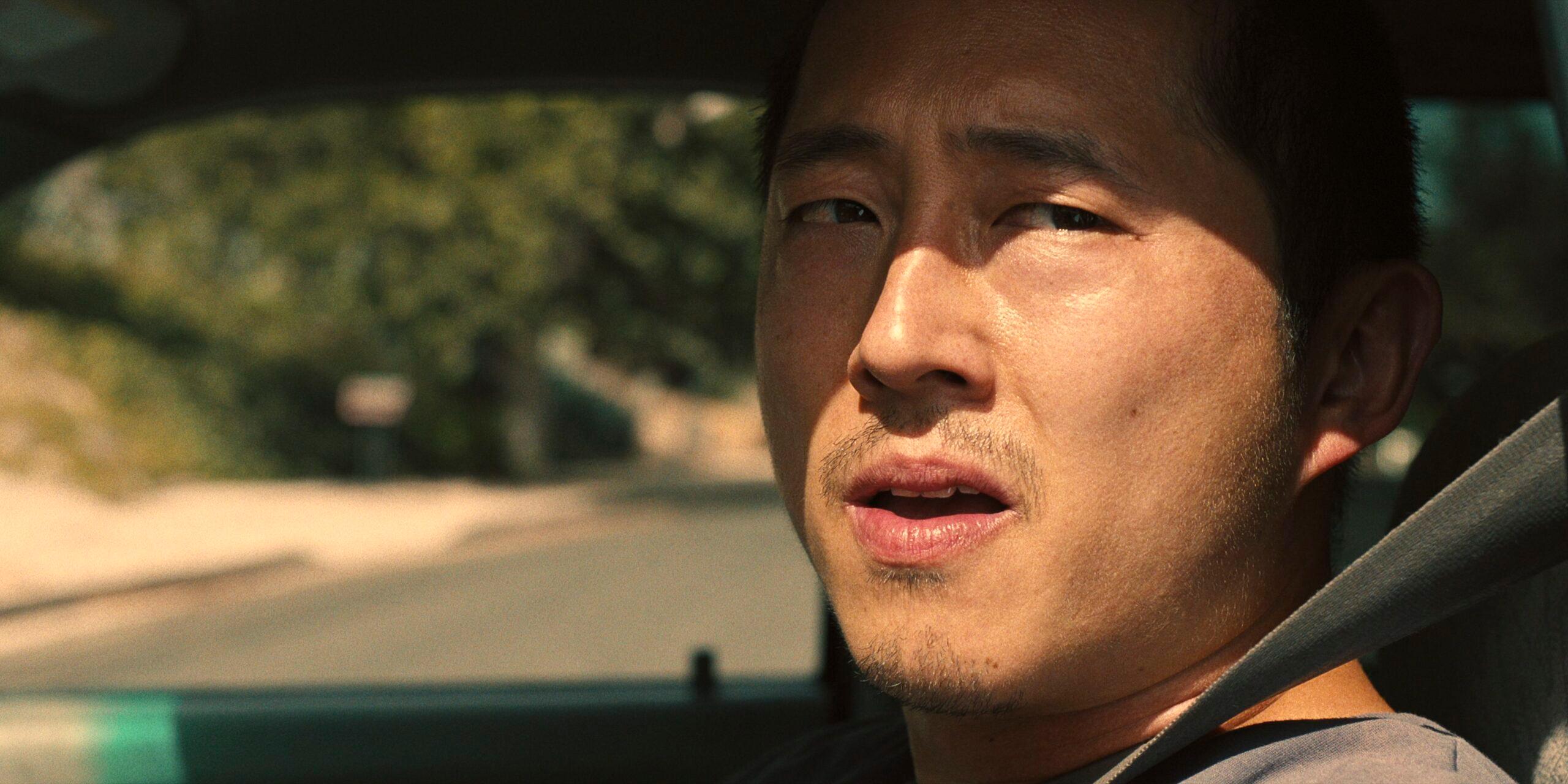
Before we’re even properly introduced to the feuding main characters of Netflix’s Beef, they square off on opposite sides of a road-rage incident that soon sends both of their lives spiraling out of control.
It all starts when Danny Cho (Steven Yeun), a failing contractor, is backing his pickup truck out of a parking space and he nearly collides with a white SUV. The unseen second driver honks—like, really honks—in retaliation, before flipping off Danny for good measure. Incensed, Danny follows the SUV out of the parking lot, and a wild car chase through the suburban streets of Los Angeles’s San Fernando Valley ensues: Red lights are ignored, flower beds are destroyed, and multiple car crashes are narrowly averted as curses, garbage, and a hibachi grill are hurled from the warring vehicles. After the confrontation ends in even more dramatic fashion, the second driver is revealed to be a woman named Amy Lau (Ali Wong), a successful entrepreneur and aspiring mogul. The conflict marks the beginning of the series’ titular beef.
Danny and Amy’s explosive introductions jeopardize both of their lives and cause them to tap into their repressed, primal furies. Their rivalry only escalates over the course of the 10-episode season, as the audience discovers more about them. “It really becomes character-first, and we try to hone in on, ‘All right, here’s Danny, failing contractor, chip on his shoulder, can’t get a W … what would that look like?’” creator and showrunner Lee Sung Jin tells The Ringer. “There would be a lot of flailing about that’s funny, but then there’d also be a lot of deep pathos. And similarly with Amy’s character, we knew Amy was someone that’s trapped in a maze of her own creation. She has it all. So there’s a lot of repression that’s probably very funny, but there’s going to be quiet moments of sadness too.”
The inciting incident of the A24-produced series, which premiered on Netflix on Thursday, was inspired by a real-life encounter that Lee had with a white SUV in 2019. The scene didn’t play out nearly as dramatically as it did with Danny and Amy, but after being honked and screamed at while sitting at a stoplight, Lee felt the sudden urge to follow the other car home. Nothing transpired from there, but the whole experience still stuck with Lee and planted the idea that would eventually grow into Beef. “I thought there was something interesting there, how we’re all locked in our subjective worldviews, and we go around projecting a lot on the other person and not really seeing things for what they are,” Lee told The New York Times.
On the surface, Beef is a delightfully twisted revenge tale that feeds off of the electric performances of its two leads, Yeun and Wong, who both double as executive producers for the series and were involved in its creative process from the start. But beneath that, the dark comedy is about much more than revenge. At its core, Beef explores the process of stepping outside of the subjective worldviews that Lee referenced, and the ways in which our projections about other people reveal more about ourselves. As Danny and Amy’s spiteful volleys ramp up from petty, mischievous acts into truly nefarious territory, their lives and relationships are laid bare in their rawest forms. For both the viewers and the show’s protagonists, the series is like an extended exercise in practicing empathy under extreme—and sometimes surreal—circumstances.
Beef marks the Oscar-nominated Yeun’s return to a lead role on live-action TV for the first time since his star-making turn as Glenn on The Walking Dead, following a wide range of captivating performances in films such as Burning, Minari, and most recently, Jordan Peele’s Nope. Wong is probably still best known for her raunchy stand-up specials, like Baby Cobra and Don Wong, but she’s also starred in films and TV shows, including Always Be My Maybe, Paper Girls, and the animated Tuca & Bertie, the latter of which she worked on with Yeun and Lee. Beef is a showcase of both actors’ tremendous range, and for Wong, it marks her most dramatic leading role to date.

Although most viewers will likely be familiar with Yeun and Wong, Danny and Amy start the series as strangers to the audience, as they are to each other. Over time, we learn of Danny’s eternal failures to get his contracting company off the ground and his strained relationship with his younger brother, Paul (Young Mazino), as well as Amy’s thriving plant business and her struggle to keep her picture-perfect life and family together. We witness them at their lowest points, as their feud—which, without giving too much away, counts catfishing and blackmail among its lesser acts of aggression—threatens to destroy everything they’ve both been working toward. They may belong to very different social circles and tax brackets, but their perpetual anger and shared existential loneliness connect them. And despite their respective shortcomings, the strength of the show’s writing and performances will likely leave viewers rooting for them through it all.
“Ultimately, if you as writers have empathy for the character, then it’ll shine through in the writing as well,” Lee says. “I do deeply love Danny and Amy both. They are very flawed, obviously, but inside that, they are just kids who have over time become more and more misunderstood. And yes, their actions are very, very questionable and sometimes outright wrong. But at the heart, I really think that they do—or at least they once did—have a good center. If you approach your characters with love and empathy, hopefully the audience will feel it too.”

That empathetic approach extends to Beef’s many memorable supporting characters, who are unwittingly pulled into the crossfire of Amy and Danny’s psychological warfare. There’s Danny’s scene-stealing cousin Isaac (David Choe), who’s freshly released from prison when we meet him, and Amy’s husband, George (Joseph Lee), the son of a famous artist who struggles to live up to his late father’s legacy. (Ironically, Lee and Choe are both very talented artists in real life; Choe’s original artwork is used in every episode’s title card except for the pilot’s.) As much as Beef often narrows its focus to its stars’ perspectives and misadventures, the show still allots time to their family and friends as those figures face distinct challenges of their own. One quiet scene midway through the season centers on George’s mother, Fumi (Patti Yasutake), who’s first featured as Amy’s overbearing mother-in-law but who’s also shown spending a solitary meal at a restaurant desperately phoning friends to chat with, only to be ignored save for a call from her accountant.
“I wanted to make sure that even our peripheral characters, that their decisions felt rooted in humanity,” Lee says. “I didn’t want [them] to just be servicing plot for plot’s sake. And so taking a little pause in the middle of the season and making sure the audience feels that all these decisions are coming from a real place helps build the stakes because it’s not just propulsion to keep the audience antsy. There’s something deeper going on there.”
Even as Beef heightens its drama amid Amy and Danny’s absurd efforts to one-up each other, this narrative approach and attention to detail help keep the series grounded.
Lee, who previously worked on series such as Undone, Dave, and Silicon Valley, has been writing on comedy shows for 15 years, but Beef marks his first time as a series creator and showrunner. (He has another major milestone coming up: He’s set to rewrite the script for Marvel’s Thunderbolts, a film that will reunite him with Yeun and director Jake Schreier, who helmed six episodes of Beef.) And the opportunity came at a unique juncture, as the series took shape during the early days of the COVID pandemic, with many of Lee, Yeun, and Wong’s initial conversations about Beef taking place over Zoom.
“During the pandemic, every other week you’d see a headline like, ‘Road Rage Up 720 Percent,’” Lee says (only slightly exaggerating the rather frightening phenomenon). “And I’m like, ‘Oh, that’s weird.’ It felt, societally, very palpable that everyone is on edge.”

Even though Lee doesn’t credit the experience of the pandemic as much of an inspiration for the series, that shared trial makes Beef feel more relevant. After a period when our collective sense of isolation, loneliness, and perhaps even rage intensified, it isn’t all that difficult to understand where characters like Danny and Amy are coming from.
In part, Beef is about having empathy for others—as is A24’s Oscar-winning Everything Everywhere All at Once, which shares a director of photography with Beef in Larkin Seiple. But much like Danny and Amy’s emotional journeys, Lee’s explanation of what he wanted to convey in the series defies a simple summation.
“I don’t know if I have a message per se, I just know that I wanted to express a feeling,” Lee explained. “And for as long as I can remember, I’ve had this feeling inside that just doesn’t go away. You try to fill it with things, and people, and goals, and it’s just so elusive. It is both sad, but also hollow and empty, and you’re just on this constant drive for feeling whole. So much of our actions derive from that root, at least for me anyway. That definitely informed a lot of the writing.
“I don’t know that there’s really much to do about that feeling—it’s probably never going to go away,” Lee continued. “That is something that I’ve just learned to accept about myself. And hopefully in the show too, it’s open to interpretation where Danny and Amy land.”


